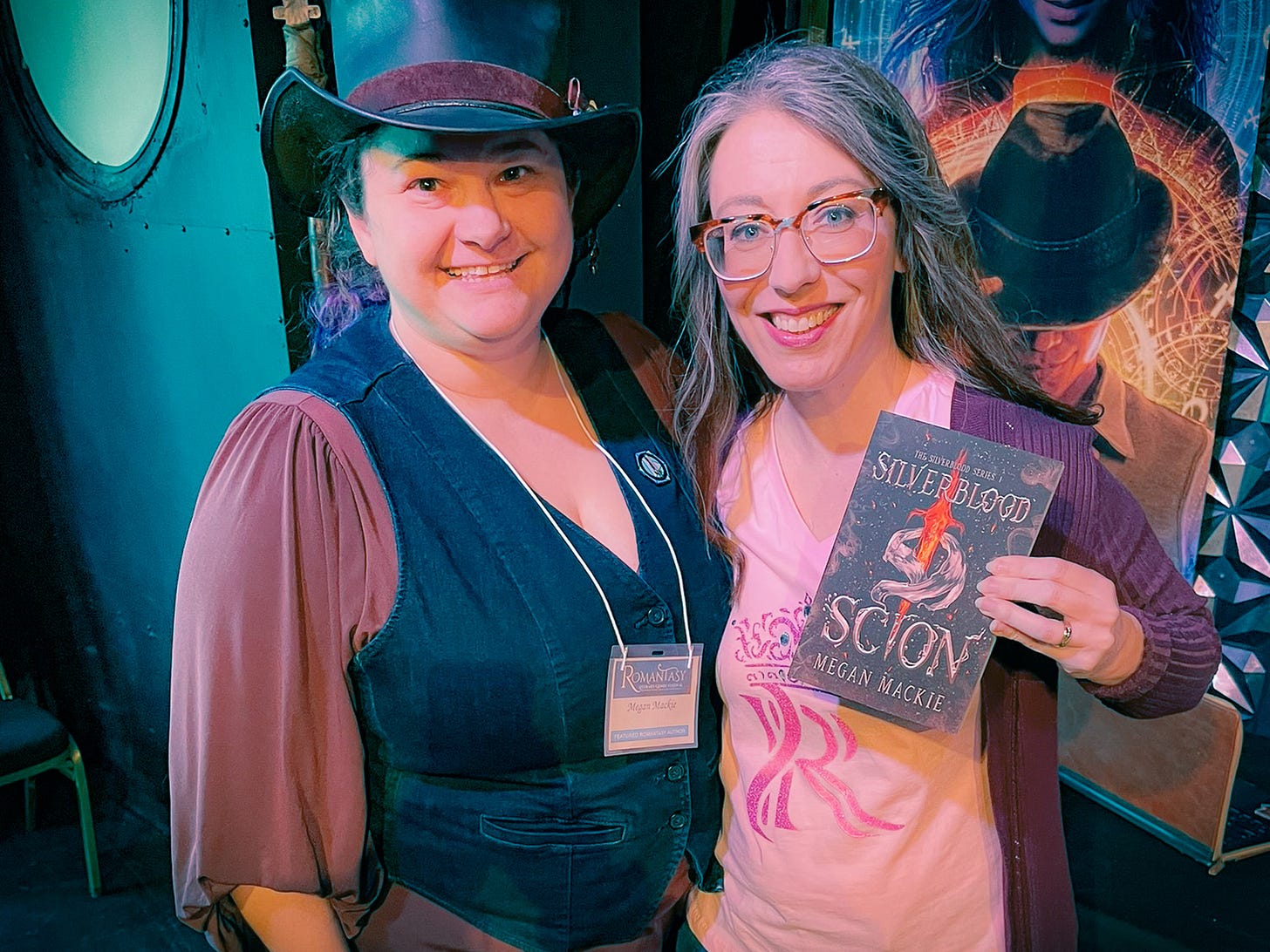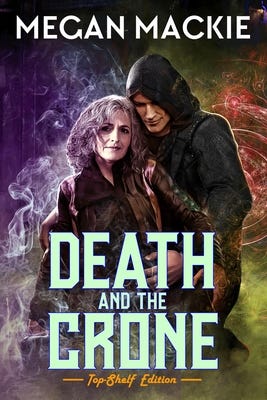Death and the Crone: A Spoiler Free Review and Bonus Author Interview
Working Title: Why should the sexy immortal always go for the teenage girl?
Romantasy Writers: Have you thought about hiring a book coach, but you’re not sure if it’s the best way to invest in your manuscript? My first coaching sessions are now free through the end of May 2024 at Book Bound Coaching! Click here to book your free session today and get started on the path to publication.
For the month of April, I’ll be reviewing one book by each of the authors featured at last month’s Chicago’s Romantasy Festival. Megan Mackie is first in line, though I’d be lying if I said choosing the first book to read from my haul was easy. Death and the Crone made the cut in part because it is a novella, and at 169 pages, I was able to read it one sitting. Secondly, C2E2 is happening at the end of the month, and Mackie will be selling her books at the Writer’s Block, Comic Con’s literary version of the Artist’s Alley.
In this subverted take on Beauty and the Beast, Mackie asks, "Why should the sexy immortal guy always fall for the swooning teen?" As someone on the older side of the romantasy reader spectrum, I loved the idea of a 68-year-old being the object of desire in this novella. I went in thinking Death and the Crone would be a silly romp. While this subverted retelling does poke fun at a trope often found in romantasy—the immortal male and the cute, young teen—don’t be fooled into thinking this book doesn’t have the page space to explore deep themes and emotional wounds.
This story brings us along as 68-year-old Margaret, a homeless drug addict, eventually falls for young, seemingly 20-something Elias. Teenage swooning has been swapped out for menopausal moodiness. As a reader of a certain age, I was hooked despite the fact Margaret is determined to be unlikeable. Set in a paranormal version of Chicago with hints of a magical world that lies just out of sight, we follow Margaret as she first enters Elias’ swanky townhome, ready to embrace death. What follows fulfills her expectations, but not in the way you’d think. Who is the Beauty, who is the Beast, and how will they transform at the end?
Death and the Crone is a standalone work based in the Lucky Devil universe. I have not read the other books in the series, so unfortunately some of the Easter Eggs were lost on me, including the appearance of the Lucky Devil pub and statue. There were other creatures populating the world that did not necessarily play a role in the narrative but nonetheless gave the story a fantasy vibe that oscillated between campy-fun and deadly-dangerous.
Death and the Crone by Megan Mackie Ratings:
Romance: 🌶️🌶️🌶️ 3 out of 5 hot peppers. (The BEST spice is actually a deleted scene included at the end. PLEASE read it, or this goes down to 🌶️🌶️ 2 out of 5 hot peppers.)
Worldbuilding/Fantasy Elements:
🧙 Wizards/Mages
🐈⬛Humanoid/animal characters
👿Devils/demons
🪄Magic
🌆Set in an alternative Chicago
Trigger Warnings: Drug abuse, miscarriage, f-bombs.
My Favorite Steamy Quote
Coaxing his fingers through her newly cut hair, she shivered. She wanted more as she skated over a cloud, disturbing its serene puffiness, brushing the cooler air with her foot.
“You are so beautiful,” he whispered, catching her up as she laughed from a spin. Gently, he touched her lips once more with his own before laying his forehead against hers.

And now, a word from Megan Mackie…
Megan Mackie was kind enough to answer the following questions sent to her via email. Perhaps someday I’ll move into podcasting with authors, but for now, I’m sticking with what I do best—which is writing.
Q1: You are known for successfully writing across genres. Both the Lucky Devil and Silverblood series can be considered romantasy. What is it about romantasy stories that appeals to you as a writer?
A: At the end of the day Romances in general are about a relationship between two characters, and I am compelled to write because of my characters. Fantasy is often about a rich world of magic and "what if" and Romantasy is the place where those two ideas meet. It's really what distinguishes it in my mind from Paranormal romance, where the fantastical creature in the romance is the point in a mundane, recognizable world. I love fantasy and spectacle, as well as the characters discovering it as they discover each other. I mean, who doesn't love to fall in love?
Ivy’s Aside: RIGHT? Don’t we all read romances to experience that rush of falling heads-over-heels again and again, but in a manner that is socially acceptable?
Q2. Death and the Crone is a fairy-tale retelling of Beauty and the Beast. How was working from an already established story different from creating a narrative from scratch?
A: Fairy-tale retellings have the benefit of having a skeletal structure that has already been proven to work. Those elements are already tested as compelling and we as authors get to play with the elements, test the limits, and say something ourselves housed in an already societally accepted framework. Everyone knows what a chocolate chip cookie is, but have you tried MY chocolate chip cookie?
Ivy’s Aside: I love this! And as long as those cookies are gluten-free, I love to try them all. Fairy-tale retellings are the same. Its one of my favorite genres under the romantasy umbrella.
Q3. What inspired you to subvert this well-known and loved fairy-tale? What were you hoping to say to your readers that the original tale does not?
A: I love the Beauty and the Beast story in all its permutations. I love the idea of seeing past each other's surface and getting deeper into the being inside, not just for the Beast but for the Beauty as well. There are so many expectations placed on beautiful people that they can stop being seen as people at all. Now I flipped the script making the male lead the Beauty and the female lead the Beast, because I feel that too often in this particular storytelling, the female character's worth is only because she is beautiful. It's a societal dogma that many of us realize isn't actually true, but it still persists: the idea that a man is only going to want us because we are beautiful and attractive in appearance, when I've known many men who have chosen wives based on other things and love them just as strongly. I wanted to tell that story.
I also have found the really old vampire/immortal dragon/immortal whatever whose a few centuries old hard to swallow when they would go for a 16 year old. At the age I am now, talking to teenagers can be hard enough, what would someone that old really get from someone that young? As Elias says in my story, "what would we have to talk about?"
Ivy’s Aside: That is why I really liked Elias so much as the love interest. I cringe when I think of the things I said or did at the age of 19. To try and have a relationship on equal terms with someone who has lived decades—or centuries—longer than many of the teen protagonists seen in books like Twilight isn’t actually realistic. That doesn’t keep me from reading and loving those books, but your story did give me some hope that perhaps I could still be considered a catch on the pages of a romantasy!
Q4. What is your favorite part of the writing process?
A: I love the rewrite phase. First drafting is hard, because you have to establish everything from the chaos soup of your mind, but when it's time to go back, reread what I wrote, I can always clearly see how to make it better or more compelling and that always gives me a thrill.
Ivy’s Aside: Me too!!! I also love coaching revisions. First drafts are so incredibly difficult.
Q5. What is your favorite novel to read that you haven't written? How has it inspired your writing?
A: Beauty by Robin McKinley. I think her influence on my own stories is quite obvious. That was the first version of this tale where Beauty was more than her appearance, she was highly educated, loved to do men's work, and had a penchant for adventure and discovery. Her appearance was secondary to those things.
Ivy’s Aside: **adding to TBR**
Q6. What advice would you give to newer writers that hope to be published in the coming months or years?
A: We are in the wild west of publishing right now and everything is changing. The old rules about how a book gets published and into people's hands or what makes it a success is not easily determined, but no matter what stage of this journey you're at or what summit you're standing on, all of these paths are the right path and all of them are worthy.
Ivy’s Aside: Luckily, there are book coaches out there to help folks that don’t quite know what path to take. We are author sherpas…we’ll get you to the top of the mountain!




